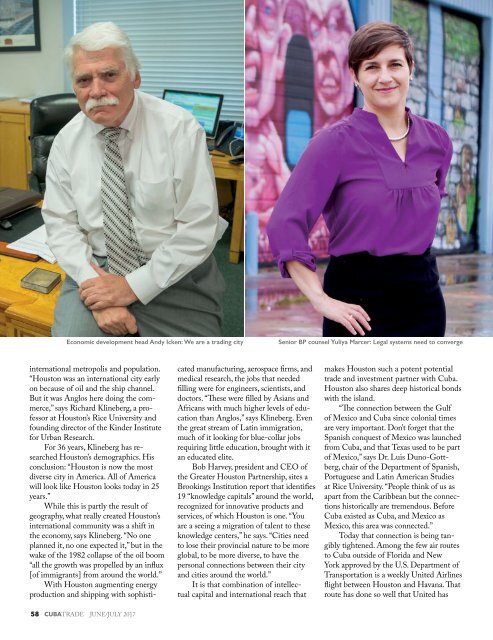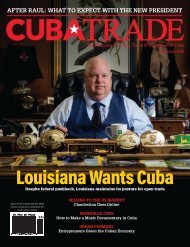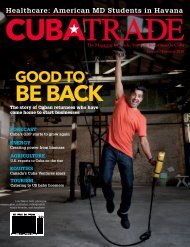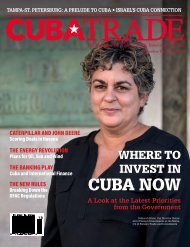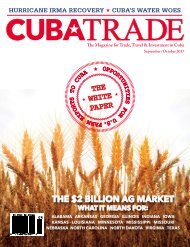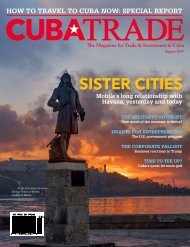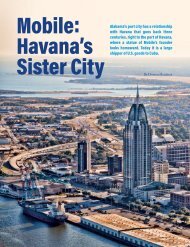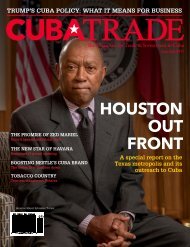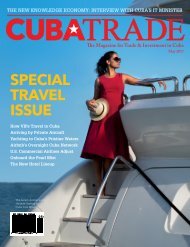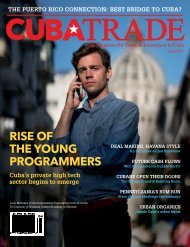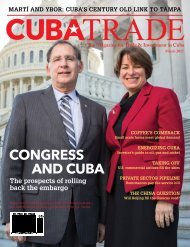Cubatrade-June-Digital
You also want an ePaper? Increase the reach of your titles
YUMPU automatically turns print PDFs into web optimized ePapers that Google loves.
Economic development head Andy Icken: We are a trading city<br />
Senior BP counsel Yuliya Marcer: Legal systems need to converge<br />
Partnership CEO Bob Harvey: Houston needs to be global<br />
Texas Medical Center CEO William McKeon: Time to collabrate<br />
cated manufacturing, aerospace firms, and<br />
medical research, the jobs that needed<br />
filling were for engineers, scientists, and<br />
doctors. “These were filled by Asians and<br />
Africans with much higher levels of education<br />
than Anglos,” says Klineberg. Even<br />
the great stream of Latin immigration,<br />
much of it looking for blue-collar jobs<br />
requiring little education, brought with it<br />
an educated elite.<br />
Bob Harvey, president and CEO of<br />
the Greater Houston Partnership, sites a<br />
Brookings Institution report that identifies<br />
19 “knowledge capitals” around the world,<br />
recognized for innovative products and<br />
services, of which Houston is one. “You<br />
are a seeing a migration of talent to these<br />
knowledge centers,” he says. “Cities need<br />
to lose their provincial nature to be more<br />
global, to be more diverse, to have the<br />
personal connections between their city<br />
and cities around the world.”<br />
It is that combination of intellectual<br />
capital and international reach that<br />
international metropolis and population.<br />
“Houston was an international city early<br />
on because of oil and the ship channel.<br />
But it was Anglos here doing the commerce,”<br />
says Richard Klineberg, a professor<br />
at Houston’s Rice University and<br />
founding director of the Kinder Institute<br />
for Urban Research.<br />
For 36 years, Klineberg has researched<br />
Houston’s demographics. His<br />
conclusion: “Houston is now the most<br />
diverse city in America. All of America<br />
will look like Houston looks today in 25<br />
years.”<br />
While this is partly the result of<br />
geography, what really created Houston’s<br />
international community was a shift in<br />
the economy, says Klineberg. “No one<br />
planned it, no one expected it,” but in the<br />
wake of the 1982 collapse of the oil boom<br />
“all the growth was propelled by an influx<br />
[of immigrants] from around the world.”<br />
With Houston augmenting energy<br />
production and shipping with sophistimakes<br />
Houston such a potent potential<br />
trade and investment partner with Cuba.<br />
Houston also shares deep historical bonds<br />
with the island.<br />
“The connection between the Gulf<br />
of Mexico and Cuba since colonial times<br />
are very important. Don’t forget that the<br />
Spanish conquest of Mexico was launched<br />
from Cuba, and that Texas used to be part<br />
of Mexico,” says Dr. Luis Duno-Gottberg,<br />
chair of the Department of Spanish,<br />
Portuguese and Latin American Studies<br />
at Rice University. “People think of us as<br />
apart from the Caribbean but the connections<br />
historically are tremendous. Before<br />
Cuba existed as Cuba, and Mexico as<br />
Mexico, this area was connected.”<br />
Today that connection is being tangibly<br />
tightened. Among the few air routes<br />
to Cuba outside of Florida and New<br />
York approved by the U.S. Department of<br />
Transportation is a weekly United Airlines<br />
flight between Houston and Havana. That<br />
route has done so well that United has<br />
Our diversity is our strength, and opening doors<br />
to Cuba is another way to expand what is already<br />
a richly diverse community<br />
applied to expand to daily service.<br />
“That route is performing exactly as<br />
we expected,” says Darrin Hall, United’s<br />
Houston-based director of corporate and<br />
government affairs. “We are pleased with<br />
both the United service out of Houston and<br />
Newark, and in Houston so much as that<br />
we are looking to expand United’s offering.”<br />
Altogether, United offers 91 daily<br />
non-stop flights to 52 destinations in Latin<br />
America and the Caribbean. “Houston<br />
will be an important gateway for service to<br />
Havana, because it will directly connect 20<br />
markets across the central U.S. with just<br />
one stop,” says Hall.<br />
William McKeon, CEO of Texas Medical Center<br />
VALUE-ADDED MEDICAL RESEARCH<br />
Like the over-sized ambitions of the Port<br />
of Houston, the Texas Medical Center<br />
began with a big vision—118 acres purchased<br />
in 1945, initially for the construction<br />
of a 1,000-bed Naval hospital. Today<br />
it is home to 54 medical institutions<br />
that include 21 hospitals, eight research<br />
institutions, and four medical schools.<br />
TMC receives more than 3,000 patients<br />
a day and more than eight million a year,<br />
including 18,000 international patients.<br />
TMC staff, including then CEO Dr.<br />
Robert Robbins, visited Cuba with Mayor<br />
Turner, and since then the center's doctors<br />
and researchers have been exploring ways<br />
of collaborating with Cuba’s health system<br />
and biopharmaceutical institutions.<br />
“The medical center has been here<br />
for 70 years and it is now the biggest<br />
medical center in the world,” says William<br />
McKeon, TMC’s new CEO and an<br />
advocate of exploring relations with Cuba.<br />
“We have a highly diverse, educated talent<br />
base. Our diversity is our strength, and<br />
opening doors to Cuba is another way to<br />
expand what is already a richly diverse<br />
community.”<br />
The TMC expands by leasing acreage<br />
to new institutions for $1 a year; these<br />
new schools, hospitals, or research labs<br />
become members of the center and<br />
subsequently share in maintenance fees<br />
for things like road maintenance, lighting<br />
and security. “Whereas most cities would<br />
have fragmented hospitals across a major<br />
metropolis, here we have physicians in<br />
oncology, neurology, orthopedics, and so<br />
58 CUBATRADE JUNE/JULY 2017<br />
JUNE/JULY 2017 CUBATRADE<br />
59


